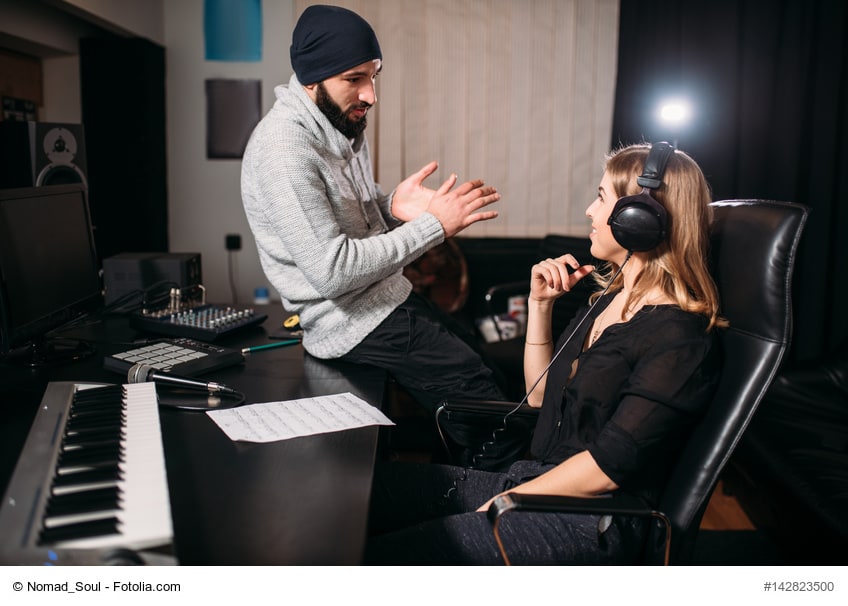Music Career Finder
Survey Start
Production Manager

How To Become a Production Manager
- Career Description
- Salary
- Career Outlook
- Career Path
- Experience & Skills
- Education & Training
- Additional Resources
- Sources
- References
Career Description
Nashville-based entertainment professional Chris Lisle says “a touring Production Manager would be the point person from the artist end that would manage, advance, and coordinate all things production, [including] audio, staging, lighting, video, trucking, tour production staff, props/scenic, Stagehands, power, logistics, etc.
“A good bit of the PM’s work is done in advance via phone and email, talking to venues/Promoters about the artist’s various needs. On the actual show day, they will be managing the department heads of the show, making sure that everything is getting in the building and set on time per the schedule.”
“They will have the ‘big picture’ view of the entire production. They will also spend quite a bit of their day on the phone and email advancing future shows. On mid and smaller level tours, the PM will also wear multiple hats, taking on other roles such as FOH Engineer, Lighting Director, etc.”
Production Managers can work for individual venues or be employed by touring productions. Since they work with all aspects of a touring act’s live show, PMs work alongside a diverse mix of professionals, including some combination of the following: Tour Manager, Tour Coordinator, Sound Technician, Guitar Technician, Lighting Technician, Tour Bus Driver, Stage Manager, Concert Hall Manager, Concert Hall Marketing Director, Talent Buyer, Nightclub Manager, and the artists themselves, of course.
Salary
On average, Production Managers earn approximately $70,800 annually. The salary range for Production Managers runs from $47,000 to $103,000.
Production Managers earn a comfortable living, but they do so by working hard and being away from home for long periods of time. “Everyone cuts their deal differently,” Lisle says, “but I recommend that PMs try to do deals that are salary or weekly based and not show pay as so much of their work is done on days off.” (Show pay means professionals are paid per show.)
Hey, what do you think about trying our new Music Career HelperMusic Career Helper really quick? It’s totally free and could help get your career moving fast! Give it a try. It’s totally free and you have nothing to lose.
Career Outlook
Since Production Managers are employed by artists on tour, they’re basically always on call.
“There is no 9-5 with that career path for sure,” Lisle says, noting the schedule can be “unpredictable. You may be doing advance phone calls and emails on flights, hotels, [and] venues. There are no set hours and there are no set circumstances. The touring PM must also accept the sacrifices of touring (as with ALL touring roles). Relationships are tough. You will miss events: weddings, birthdays, etc. The touring lifestyle can be physically tough as well.”
Career Path
Because PMs are involved with so many different areas within the production of a show, they come from a range of backgrounds. “A couple of different paths all led me to the same place,” Lisle says. “I worked as a touring Lighting Director and management noticed that I had the skills needed to be a PM. When the existing PM left, I got offered that role. I also had a background in doing production work for special events, TV shows, and radio shows.”
In terms of advancement, many Production Managers start their careers as part of the Road Crew; as Sound Technicians or Lighting Technicians, for example. Ultimately they can work their way up to a Production Manager role, one of the most high-ranking titles in the world of concert touring. Once someone has PM experience, he or she can advance by working with more famous artists.
In order to land a first job on the road, it’s necessary to know other members of the road crew who can recommend you. Lisle advises aspiring PMs to “get out in the touring world in a technical field and learn/grow. Network and get to know the ‘players.’ If you get with a small enough act, you might be able to instantly jump into the PM role while also wearing another hat (like FOH Engineer).”
- Find your initial technical career path and pursue that.
- Learn the basics of what ALL departments are doing.
- NETWORK. Let your ‘networking tree’ know of your interest in the PM field.
Experience & Skills
Although Production Managers must possess an impressive array of technical skills related to lighting, sound, backline and so on, Lisle believes the most important skills for a PM to possess are interpersonal skills.
“A PM should have a few key skills: organization, communication, ability to work under pressure/stress, [and] conflict resolution.” He says, “The technical skills can all be learned as necessary but these personality-based skills need to be ingrained in you.”
According to Lisle, a successful Production Manager is, by nature, “hard-working, team-oriented, outgoing, patient, and organized.” This type of personality will help the PM manage his or her road team and keep the production on track, ensuring load in and load out times can be met and the tour can keep moving.
Education & Training
The essential training for a career as a Production Manager can only be gained via working in the live music industry, whether you work at a venue or on the road. However, college degree programs in areas such as Music Business, Music Management, Sound Production/Engineering, Production Design or even Theatrical Production can give the aspiring PM some of the knowledge of the industry and technical skills they’ll need.
Lisle says, “I feel that you should find a production field that interests you (lighting, audio, video, backline, staging) and pursue that. Get your foot in the door and as you perform your trade, you will learn about the other departments and roles. A good PM will know just enough about all technical aspects of the show.”
Additional Resources
“The Event Safety Alliance is key, as so much of what we do in the live entertainment sector is very scrutinized from a safety standpoint. Learn event/show safety and learn the protocols that they are encouraging [and] teaching,” Lisle says.
In terms of associations and groups that can help a Production Manager grow in his or her career, he suggests, “I would also encourage attending industry functions for the networking aspect,” with events sponsored by the Professional Lighting and Sound Association, Live Design International and Pollstar considered to be the most helpful.
Sources

Chris Lisle
Chris Lisle is a Nashville-based Production Manager and Lighting Designer. As a Production Manager, he has worked with Peter Frampton, Robert Plant and the Band of Joy, Kenny “Babyface” Edmonds, Lee Ann Womack, and Dolly Parton. His concert lighting design experience is extensive, having worked with Miranda Lambert, OneRepublic, Keith Urban, Robert Plant, and Quincy Jones, to name just a few.
He is the founder and Executive Director of the Touring Career Workshop, a non-profit event that bills itself as providing “Human Resources for Touring Production Professionals.”
Lisle’s career has been profiled by NAMM, Projection Lights and Staging News, Inside Music City, Music Row, Live Design Online, and Lighting and Sound America.
He has served as a featured speaker to Belmont University’s Mike Curb College of Entertainment and Music Business.
References
- 1. "Production Manager Salaries in United States". Glassdoor.com. published: Dec 20, 2019. retrieved on: Dec 20, 2019